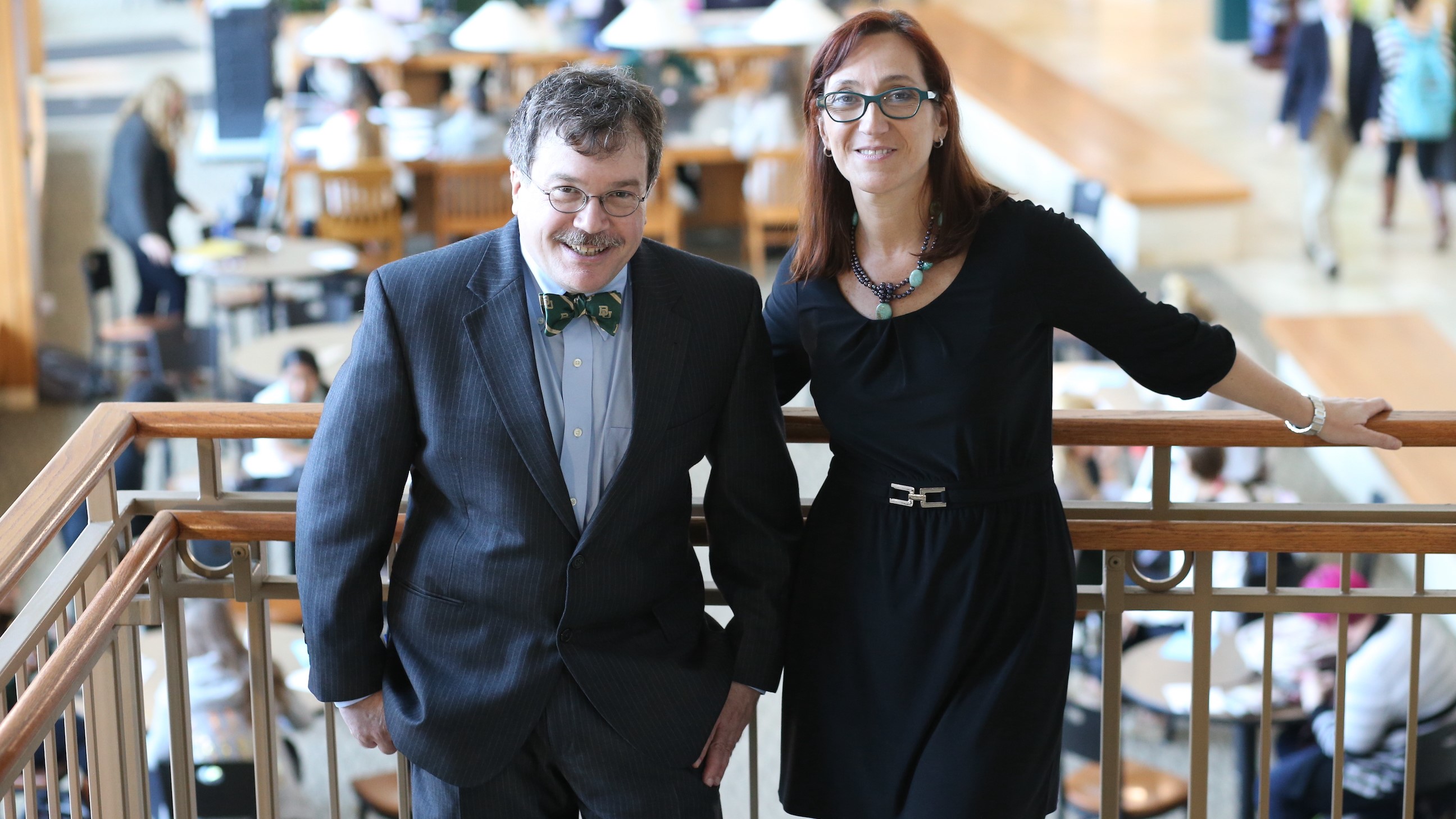BCM Vaccinology Pioneers to Speak about Development of Low-cost, Patent-free COVID-19 Vaccine

Baylor College of Medicine vaccinology pioneers Peter J. Hotez, M.D., Ph.D., and Maria Elena Bottazzi, Ph.D.
Peter J. Hotez, M.D., Ph.D., and Maria Elena Bottazzi, Ph.D., will give a lecture Feb. 16 about developing Corbevax for global access
Media Contact: Lori Fogleman, Baylor University Media and Public Relations, 254-709-5959
Follow us on Twitter: @BaylorUMedia
By Randy Fiedler, Baylor University College of Arts & Sciences
WACO, Texas (Feb. 13, 2023) – Baylor College of Medicine vaccinology pioneers Peter J. Hotez, M.D., Ph.D., and Maria Elena Bottazzi, Ph.D., are continuing their efforts to advance their low-cost, patent-free COVID-19 vaccine technology to reach unvaccinated peoples in India and other underserved countries of the world.
Hotez, founding dean of BCM’s National School of Tropical Medicine, and Bottazzi, NTSM’s senior associate dean, will give a lecture titled “Behind the Scenes for the Development of a COVID-19 Vaccine Suitable for Global Access” at 3:30 p.m. Thursday, Feb. 16, 2023, in Room B-110 of the Baylor Sciences Building, 101 Bagby Ave., on the Baylor University campus. The lecture is free and open to the public. Both professors hold faculty appointments at Baylor University with Hotez serving as University Professor of Biology and Bottazzi as Distinguished Professor of Biology.Hotez and Bottazzi led a team of scientists at their Texas Children’s Hospital Center for Vaccine Development at BCM, which in 2020 embarked toward the development of recombinant protein-based COVID-19 vaccine technology. Using an open-science approach, the team developed a formula for the vaccine – known as Corbevax in India – that can be licensed by vaccine producers in low- or middle-income nations at a fraction of the cost of vaccines widely available in other parts of the world.
“Our intent was to make it available to millions of people in the world who would otherwise not have access to COVID vaccines,” Hotez said in a 2022 Texas Tribune article.
The Corbevax vaccine was approved for use in India in December 2021, and since then, the Indian government says more than 70 million doses have been given to children there. The vaccine has been authorized for use as a booster to people 18 or older, according to Hotez.
For their efforts to develop the new vaccine, Hotez and Bottazzi were nominated for the Nobel Peace Prize by U.S. Rep. Lizzie Fletcher, D-Houston.
“Dr. Hotez and Dr. Bottazzi’s effort to develop the Corbevax vaccine is truly one of international cooperation and partnership to bring health, security, and peace around the world by creating a COVID-19 vaccine and making it available and accessible to all,” wrote Fletcher in her official nomination.
In their Baylor lecture, Hotez and Bottazzi will share their experiences developing Corbevax.
“We will provide a behind-the-scenes vignette of the case study of a recombinant protein-based vaccine technology that led to the development of Corbevax in India and Halal-certified Indovac in Indonesia,” Bottazzi said. “Our presentation will also highlight how the COVID-19 experience will accelerate the development of neglected tropical disease vaccines."
ABOUT BAYLOR UNIVERSITY
Baylor University is a private Christian University and a nationally ranked Research 1 institution. The University provides a vibrant campus community for more than 20,000 students by blending interdisciplinary research with an international reputation for educational excellence and a faculty commitment to teaching and scholarship. Chartered in 1845 by the Republic of Texas through the efforts of Baptist pioneers, Baylor is the oldest continually operating University in Texas. Located in Waco, Baylor welcomes students from all 50 states and more than 100 countries to study a broad range of degrees among its 12 nationally recognized academic divisions.
ABOUT THE COLLEGE OF ARTS & SCIENCES AT BAYLOR UNIVERSITY
The College of Arts & Sciences is Baylor University’s largest academic division, consisting of 25 academic departments in the sciences, humanities, fine arts and social sciences, as well as 11 academic centers and institutes. The more than 5,000 courses taught in the College span topics from art and theatre to religion, philosophy, sociology and the natural sciences. The College’s undergraduate Unified Core Curriculum, which routinely receives top grades in national assessments, emphasizes a liberal education characterized by critical thinking, communication, civic engagement and Christian commitment. Arts & Sciences faculty conduct research around the world, and research on the undergraduate and graduate level is prevalent throughout all disciplines. Visit baylor.edu/artsandsciences.